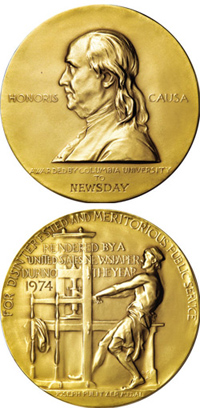Pulitzer Prize Spotlight: Joseph Pulitzer
Pulitzer Prize Spotlight: Joseph Pulitzer
By Kathryn Harris on July 28, 2010

The Iconic Pulitzer Prize Medal
A few months ago, the Broadway musical NEXT TO NORMAL made history by being only the eighth musical to ever be awarded the Pulitzer Prize for Drama. The highly prestigious award is given out each year to an original American play or musical that a jury - composed of three critics, an academic, and a playwright - feels is a distinguished piece of American theatre. This series of articles will look at the history of the Pulitzer Prize and the man who created it, as well as the many MTI shows that have received this high honor.
The Pulitzer Prize is the creation of Hungarian-born Joseph Pulitzer. The son of a prosperous merchant, Pulitzer studied under tutors and attended private schools in Budapest. At seventeen, he repeatedly tried to enlist in the military - first in the Austrian Army; then in Napoleon's foreign legion; and finally in the British Army. None of these attempts proved successful, however, due to health problems. Eventually, Pulitzer did manage to enlist in the military, by enrolling in the United States in place of someone who was drafted. But on the way to America, he ran off so he could keep the money himself, instead of giving it to the agent who recruited him. After enlisting for a year, Pulitzer made his way to St. Louis, where he devoted his energy towards studying law and English in the city's library.
It was in the library where he found his career breakthrough. While watching a chess game in the library's chess room, Pulitzer so impressed the players with his criticism of their moves that they began talking to him. The players were in fact editors of a major German-speaking newspaper, and offered him a job. Pulitzer, a driven journalist, quickly became a publisher, and when he was 25 became the owner of the St. Louis Post-Dispatch.
Pulitzer's health issues plagued him for the rest of his life, and his passion for journalistic excellence only caused his health to deteriorate further. Time after time, Pulitzer ignored his health for the sake of his career, forgoing doctor-ordered vacations, sleep, and immersing himself in stressful situations. Crusading against corruption, Pulitzer revolutionized journalism. He was the first to fully use illustrations, he staged news stunts, and he raised the circulation of The New York World, which he purchased to save from financial ruin. Pulitzer can even be credited with bringing the Statue of Liberty to New York. The World's subscriptions raised enough money to build a pedestal for the statue in New York Harbor, giving it a place to rest once it finally left France. The physical toll of all this work, however, culminated in Pulitzer becoming practically blind, severely depressed, and suffering from a disease that made him extremely sensitive to noise. He still managed to control his papers, however, and engaged in an intense circulation battle with William Randolph Hearst.
Pulitzer strongly believed in journalists being trained on the university level, and was the first to publicly push for the creation of such a program. A year after his death in 1911, his dream came true with the creation of the Columbia School of Journalism.
The next article in the series will look at the history of the Pulitzer Prizes, particular the Pulitzer Prize for Drama.
To learn more about the Pulitzer Prize, check out pulitzer.org.
Share
Callboard
-
Shake and shimmy it with the #Hairspray20Challenge! Join MTI and Broadway Media in celebrating 20 years of #Hairspray. Duet this here or find us on TikTok! Special thanks to @broadwaymedia and @jammyprod. Choreography Guides are a licensor official resource that provides step-by-step instruction from Broadway and professional choreographers for your productions! Visit @broadwaymedia to learn more. #mtishows #youcantstopthebeat #hairspraymusical #goodmorningbaltimore
View on Instagram
























